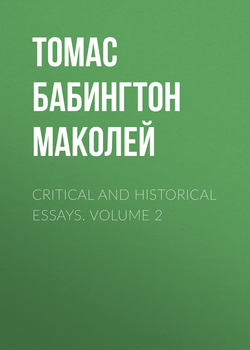Critical and Historical Essays. Volume 2

Реклама. ООО «ЛитРес», ИНН: 7719571260.
Оглавление
Томас Бабингтон Маколей. Critical and Historical Essays. Volume 2
MACHIAVELLI
VON RANKE
WAR OF THE SUCCESSION IN SPAIN
FREDERIC THE GREAT
SOUTHEY’S COLLOQUIES
CIVIL DISABILITIES OF THE JEWS
GLADSTONE ON CHURCH AND STATE
FRANCIS BACON
JOHN BUNYAN
LEIGH HUNT
THE LIFE AND WRITINGS OF ADDISON
SAMUEL JOHNSON
MADAME D’ARBLAY
MOORE’S LIFE OF LORD BYRON
MR. ROBERT MONTGOMERY
INDEX AND GLOSSARY OF ALLUSIONS
Отрывок из книги
(October 1840) The Ecclesiastical and political History of the Popes of Rome, during the Sixteenth and Seventeenth Centuries. By LEOPOLD RANKE, Professor in the University of Berlin: Translated from the German, by SARAH AUSTIN. 3 vols. 8vo. London: 1840.
IT IS hardly necessary for us to say that this is an excellent book excellently translated. The original work of Professor Ranke is known and esteemed wherever German literature is studied, and has been found interesting even in a most inaccurate and dishonest French version. It is, indeed, the work of a mind fitted both for minute researches and for large speculations. It is written also in an admirable spirit, equally remote from levity and bigotry, serious and earnest, yet tolerant and impartial. It is, therefore, with the greatest pleasure that we now see this book take its place among the English classics. Of the translation we need only say that it is such as might be expected from the skill, the taste, and the scrupulous integrity of the accomplished lady who, as an interpreter between the mind of Germany and the mind of Britain, has already deserved so well of both countries.
.....
During the eighteenth century, the influence of the Church of Rome was constantly on the decline. Unbelief made extensive conquests in all the Catholic countries of Europe, and in some countries obtained a complete ascendency. The Papacy was at length brought so low as to be an object of derision to infidels, and of pity rather than of hatred to Protestants. During the nineteenth century, this fallen Church has been gradually rising from her depressed state and reconquering her old dominion. No person who calmly reflects on what, within the last few years, has passed in Spain, in Italy, in South America, in Ireland, in the Netherlands, in Prussia, even in France, can doubt that the power of this Church over the hearts and minds of men, is now greater far than it was when the Encyclopaedia and the Philosophical Dictionary appeared. It is surely remarkable, that neither the moral revolution of the eighteenth century, nor the moral counter-revolution of the nineteenth, should, in any perceptible degree, have added to the domain of Protestantism. During the former period, whatever was lost to Catholicism was lost also to Christianity; during the latter, whatever was regained by Christianity in Catholic countries was regained also by Catholicism. We should naturally have expected that many minds, on the way from superstition to infidelity, or on the way back from infidelity to superstition, would have stopped at an intermediate point. Between the doctrines taught in the schools of the Jesuits, and those which were maintained at the little supper parties of the Baron Holbach, there is a vast interval, in which the human mind, it should seem, might find for itself some resting-place more satisfactory than either of the two extremes. And at the time of the Reformation, millions found such a resting-place. Whole nations then renounced Popery without ceasing to believe in a first cause, in a future life, or in the Divine mission of Jesus. In the last century, on the other hand, when a Catholic renounced his belief in the real Presence, it was a thousand to one that he renounced his belief in the Gospel too; and, when the reaction took place, with belief in the Gospel came back belief in the real presence.
We by no means venture to deduce from these phenomena any general law; but we think it a most remarkable fact, that no Christian nation, which did not adopt the principles of the Reformation before the end of the sixteenth century, should ever have adopted them. Catholic communities have, since that time, become infidel and become Catholic again; but none has become Protestant.
.....